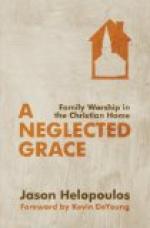* * * * *
“Why, memory, cling thus to
life’s jocund morning?
Why point to its treasures exhausted too soon?
Or tell that the buds of the heart at the dawning,
Were destined to wither and perish at noon?
“On the past sadly musing,
oh pause not a moment;
Could we live o’er again but one bright
sunny day;
’Twere better than ages of present enjoyment,
In the memory of scenes that have long passed
away.
“But time ne’er retraces the
footsteps he measures;
In fancy alone with the past
we can dwell;
Then take my last blessing, loved scene
of young pleasures;
Dear home of my childhood—forever
farewell!”
CHIEF JUSTICE GIBSON.
The bereavements of home fill up the urn of memory with its most hallowed treasures. Though these memories of the household have an alloy of sorrow and are the product of its adversities, yet there is no pleasure so delicate, so pure, so painful, so much longed after, as that which they afford. They bring to our hearts the purest essence of the past, and cause us to live it over again. They come over us like the “breath of the sweet south breathing over a bed of violets.” When we revert to the happy scenes of our childhood, we live amid them in spirit again, and remembrance swells with many a proof of recollected love; sweet ideals of all that lived under the parental roof spring up within us, and pass before us in visions of delight; the home of the past becomes the home of the present. The things of that home are spiritualized and changed into the thoughts of home; we enjoy them again; and we live our life over again with those we loved the most.
“Why
in age
Do we revert so fondly to the walks
Of childhood, but that there the soul
discerns
The dear memorial footsteps, unimpaired,
Of her own native vigor; thence can hear
Reverberations, and a choral song
Commingling with the incense that ascends,
Undaunted, towards the imperishable heavens,
From her own lonely altar?”
The memories of home are both pleasing and painful. When we leave the parental home for some distant land, how many pleasing recollections sweep over our spirits then. Even when tossed to and fro upon the angry wave, far from our native land.
“There comes a fond memory
Of home o’er the deep.”
The memory of departed worth is a kind of compensation for the loss we sustain. The pious mother’s recollection of her sainted husband or child becomes the soother of her grief, and casts a pleasing light along her pathway, and awakens a new joy in her widowed heart. Pious memories, when they reflect the hope of reunion in heaven, are like the radiant sky studded with brilliant stars, each shining through the clouds which move along the verge of the horizon. They sweep as gently over the troubled heart as the summer zephyr over the blushing rose, touching all the chords of holy feeling, making them vibrate sadly sweet, in blended tones, too sweet to last.




